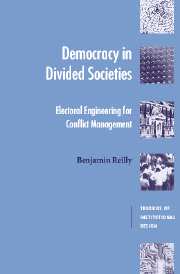Book contents
- Frontmatter
- Contents
- List of illustrations
- List of tables
- Acknowledgements
- List of abbreviations
- 1 Introduction: democracy in divided societies
- 2 The historical development of preferential voting
- 3 Centripetal incentives and political engineering in Australia
- 4 The rise and fall of centripetalism in Papua New Guinea
- 5 Electoral engineering and conflict management in divided societies (I): Fiji and Sri Lanka compared
- 6 Electoral engineering and conflict management in divided societies (II): Northern Ireland, Estonia and beyond
- 7 Technical variations and the theory of preference voting
- 8 Conclusion: assessing the evidence
- References
- Index
6 - Electoral engineering and conflict management in divided societies (II): Northern Ireland, Estonia and beyond
Published online by Cambridge University Press: 22 September 2009
- Frontmatter
- Contents
- List of illustrations
- List of tables
- Acknowledgements
- List of abbreviations
- 1 Introduction: democracy in divided societies
- 2 The historical development of preferential voting
- 3 Centripetal incentives and political engineering in Australia
- 4 The rise and fall of centripetalism in Papua New Guinea
- 5 Electoral engineering and conflict management in divided societies (I): Fiji and Sri Lanka compared
- 6 Electoral engineering and conflict management in divided societies (II): Northern Ireland, Estonia and beyond
- 7 Technical variations and the theory of preference voting
- 8 Conclusion: assessing the evidence
- References
- Index
Summary
So far, this book has focussed largely upon the conflict-management potential of one preferential electoral system: the alternative vote. However, as discussed in Chapter 1, there are at least three different preferential voting systems used for national elections around the world consisting of two majority systems – AV and SV – plus the single transferable vote (STV) form of proportional representation. Interestingly, all of these system variations have been advocated, at various times as the most appropriate electoral systems for divided societies. STV in particular has attracted legions of admirers and many advocates in both homogeneous and multi-ethnic societies, but has been introduced in relatively few countries. SV was, as we have seen, introduced as part of Sri Lanka's 1978 constitutional settlement, and subsequently recommended by scholars like Donald Horowitz as being particularly appropriate for divided societies elsewhere. And, as we have also seen, AV has attracted a considerable degree of support in countries like Papua New Guinea, and was introduced in 1997 as part of the constitutional settlement in Fiji.
These and other forms of preferential voting also have an interesting history of experimentation in other regions, particularly in Europe and North America. STV, for example, has been used for elections in several European states since the 1920s, and was once also widespread in local jurisdictions in North America – at one stage being used for Canadian provincial elections in Alberta, Manitoba and British Columbia, and for council elections in around two dozen cities in the United States.
- Type
- Chapter
- Information
- Democracy in Divided SocietiesElectoral Engineering for Conflict Management, pp. 129 - 148Publisher: Cambridge University PressPrint publication year: 2001



